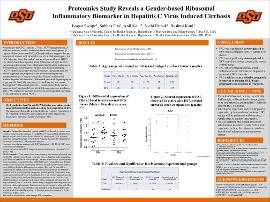| dc.contributor.author | Swope, Logan | |
| dc.contributor.author | Das, Subhas | |
| dc.contributor.author | Pathak, Sachi | |
| dc.contributor.author | Kaul, Anil | |
| dc.contributor.author | Kaul, Rashmi | |
| dc.date.accessioned | 2023-09-12T16:45:15Z | |
| dc.date.available | 2023-09-12T16:45:15Z | |
| dc.date.issued | 2022-02-18 | |
| dc.identifier | ouhd_Swope_proteomicsstudyrevealsgenderbased_2022 | |
| dc.identifier.citation | Swope, L., Das, S., Pathak, S., Kaul, A., & Kaul, R. (2022, February 18). Proteomics study reveals a gender-based ribosomal inflammatory biomarker in Hepatitis C virus induced cirrhosis. Poster presented at Research Days at Oklahoma State University Center for Health Sciences, Tulsa, Ok. | |
| dc.identifier.uri | https://hdl.handle.net/11244/339555 | |
| dc.description.abstract | Hepatitis C Virus (HCV) infection is a major cause of Hepatocellular Carcinoma (HCC). Further, HCC is a leading cause of liver-related death world-wide linked to liver cirrhosis and chronic liver disease. Clinical evidence suggests that pre-menopausal women, with elevated levels of circulating estrogen, clear HCV infection faster than males, and show low incidence of HCC. Our studies have shown gender-based differential estrogen receptor expression in the normal liver, which could contribute to protection in pre-menopausal women against chronic liver diseases including HCC. There is a gap in the current knowledge of biomarkers that could be used for early detection of HCV-related cirrhosis and HCC development. Further, biomarkers that account for gender differences in HCV-related pathogenesis have not yet been identified. | |
| dc.description.abstract | The purpose of this study was to identify early cancer biomarkers in HCV-related cirrhosis by analyzing liver proteins-specifically focusing on ribosomal family of proteins (RPs). Ribosomal proteins play an important role in cellular apoptosis, cell proliferation, and cancer development. Ribosomes convert mRNA into proteins using various RPs and have been shown to change in different tissues and tumors. Ribosomal gene FAU (Finkel-Biskis-Reilly murine sarcoma virus) has recently been identified as an apoptosis regulatory gene involved in ovarian, breast, and prostate cancer. To identify gender-based protein differences in male and female liver cirrhosis patients, we investigated RPs via proteomic study. Normal and HCV diseased liver tissue extracts were processed and sent to NIH IDeA National Resource for Quantitative Proteomics core lab for DIA proteomic analysis. We had four experimental groups with 10 samples in each group. The four groups included were normal control male, normal control female, HCV cirrhosis male, and HCV cirrhosis female. A total of 4,443 proteins were identified of which 132 were ribosomal proteins. Within the ribosomal protein cohort, 78 exhibited differential expression in liver cirrhosis compared to normals, with 13 showing gender-based significance. | |
| dc.description.abstract | FAU gene encodes for the 40S ribosomal protein S30 in the cytoplasmic ribosome and illustrated gender-based differences in cirrhosis group. FAU was significantly upregulated (logFC 1.04050553) in HCV females compared to HCV male liver tissues (p-value .0012) and was significantly downregulated in HCV male liver tissues compared to normal control males. No differences were observed in remaining experimental groups (HCV F vs. normal control F and normal control M vs. normal control F). This study identified the ribosomal protein FAU and its potential to serve as a novel gender-based biomarker in liver cirrhosis and cancer development. | |
| dc.description.abstract | This finding could be essential in understanding why males may be more susceptible to developing HCC. To our knowledge, this is the first report showing FAU ribosomal protein in HCV-related cirrhosis with significant gender-based differences. FAU could serve as a valuable prognostic biomarker to monitor HCC disease progression and response to treatment. | |
| dc.format | application/pdf | |
| dc.language | en_US | |
| dc.publisher | Oklahoma State University Center for Health Sciences | |
| dc.rights | The author(s) retain the copyright or have the right to deposit the item giving the Oklahoma State University Library a limited, non-exclusive right to share this material in its institutional repository. Contact Digital Resources and Discovery Services at lib-dls@okstate.edu or 405-744-9161 for the permission policy on the use, reproduction or distribution of this material. | |
| dc.title | Proteomics study reveals a gender-based ribosomal inflammatory biomarker in Hepatitis C virus induced cirrhosis | |
| osu.filename | ouhd_Swope_proteomicsstudyrevealsgenderbased_2022.pdf | |
| dc.type.genre | Presentation | |
| dc.type.material | Text | |
| dc.subject.keywords | Hepatitis C virus | |
| dc.subject.keywords | liver cirrhosis | |
| dc.subject.keywords | ribosomal proteins | |
| dc.subject.keywords | gender | |
